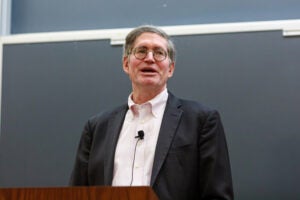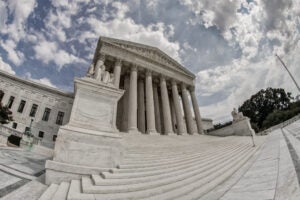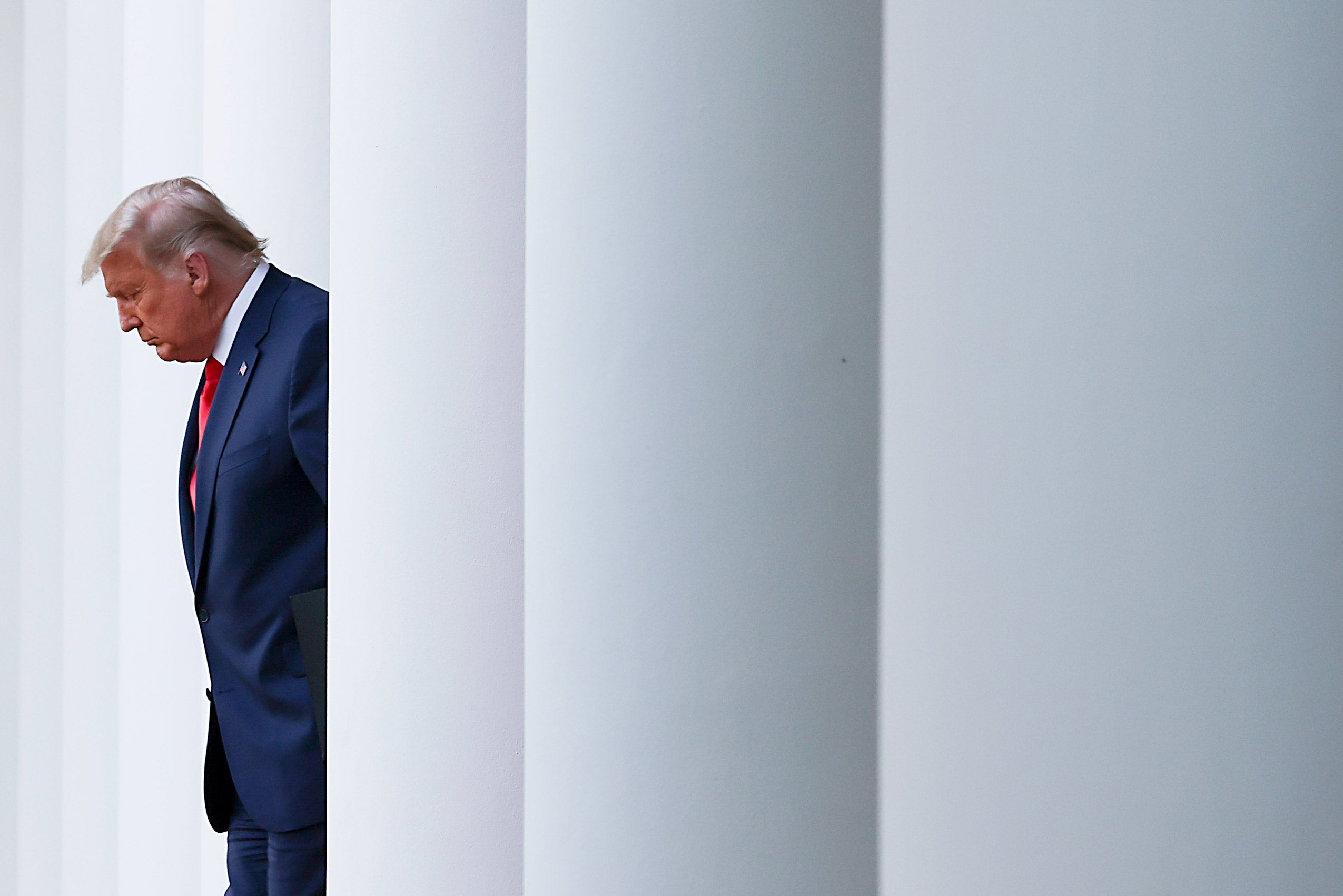People
Michael Klarman
-
Is SCOTUS a political institution? Do its holdings bend to popular culture? Can universities consider race in their admissions process? No, they cannot… because the…
-
‘Education can change ordinary people’s lives’
May 9, 2023
For as long as she can remember, Tushigjargal Bold LL.M. ’23 has enjoyed such a wide variety of interests that it’s been hard to focus on just one.
-
‘American democracy is more under threat now than it has been in the lifetime of anyone currently alive’
April 3, 2023
In his last lecture to the J.D. and LL.M. classes of 2023, Michael Klarman celebrates civil rights heroes and issues a clarion call for democratic engagement.
-
Separate but Unequal
February 14, 2023
A new book co-written by Harvard Law School alumnus Andrew Stobo Sniderman LL.M. ’22, spotlights inequities in Canada’s Indigenous communities — and a path toward justice
-
The Case for Supreme Court Term Limits Just Got a Lot Better
November 28, 2022
The most striking detail in the recent investigation by The New York Times into another potential Supreme Court breach is not the evidence that Justice…
-
The Constitution makes reference to voting 15 times in the original document and another 22 in the amendments. But somewhat surprisingly, none of those mentions…
-
You thought the Supreme Court’s last term was bad? Brace yourself.
October 18, 2022
The cataclysmic Supreme Court term that included the unprecedented leak of a draft opinion and the end of constitutional protection for abortion would, in the…
-
‘A Crisis Coming’: The Twin Threats to American Democracy
September 19, 2022
The United States has experienced deep political turmoil several times before over the past century. The Great Depression caused Americans to doubt the country’s economic…
-
Harvard Law School experts weigh in on the Supreme Court’s final decisions.
-
Roe vs. Wade, the Supreme Court’s best-known decision of the last 50 years, is also its most endangered precedent. It gave women nationwide the legal right to choose abortion, but the backlash reshaped the country’s politics. The landmark ruling may well be overturned by conservative justices appointed by Republican presidents to do just that. What went wrong with Roe? Why did the court’s effort to resolve the abortion controversy in 1973 lead instead to decades of division? ... “The first-trimester/second-trimester dividing line is a big deal,” said Harvard Law School professor Michael Klarman. “It’s why ‘partial-birth’ abortion laws were such a political gold mine for Republicans. Roe created such a broad abortion right that it probably pushed some of the many Americans in the middle of the spectrum on this issue into the opposition.”
-
Roe vs. Wade, the Supreme Court’s best-known decision of the past 50 years, is also its most endangered precedent. It gave women a nationwide legal right to choose abortion, but the backlash reshaped the nation’s politics. The landmark ruling now faces being overturned by conservative justices appointed by Republican presidents to do just that. What went wrong with Roe? Why did the court’s effort to resolve the abortion controversy in 1973 lead instead to decades of division? ... “The first-trimester/second-trimester dividing line is a big deal,” said Harvard Law School professor Michael Klarman. “It’s why ‘partial-birth’ abortion laws were such a political gold mine for Republicans. Roe created such a broad abortion right that it probably pushed some of the many Americans in the middle of the spectrum on this issue into the opposition.”
-
A new book by Rohan J. Alva, counsel at the Supreme Court, gives an eye-opening account on the origins of the most important fundamental right in the Indian Constitution — the right to life and personal liberty guaranteed by Article 21. Titled ‘Liberty after Freedom’, the book explores Article 21 that has, in recent years, made the right to privacy as well as the decriminalisation of homosexuality possible. ... Michael Klarman, professor at Harvard Law, called the book an ambitious and fascinating account, adding that “Alva sheds interesting historical and comparative light on the well-nigh irresolvable conflict between a society’s commitment to protecting the fundamental rights of individuals and constraining the power of unrepresentative and politically less-accountable judges”.
-
When Republican leaders make judicial appointments, they are often looking for only one thing: whether a candidate adheres to the school of thought known as constitutional originalism. There’s a simple reason for that singular focus. To originalism proponents, it signals that judges will remain steadfast to the intended meaning of the Constitution rather than to the many ways it could be interpreted today. To its detractors, it’s a “dog whistle” to those on the right looking for judges who will consistently rule in a conservative-leaning way. ... Constitutional originalism is loosely defined as interpreting the Constitution “according to the original understanding,” says Harvard Law School professor Michael Klarman. What that means is focusing first and foremost on what the framers intended when they wrote the Constitution. “Originalism has always been around,” Klarman tells Teen Vogue. “When judges interpret the Constitution, one of the things that they do is look at what the terms in the Constitution mean to the generation that wrote them and ratified them.”
-
Guest: Michael J. Klarman is Kirkland + Ellis Professor of Law at Harvard Law School and author of the Bancroft Prize-winning From Jim Crow to Civil Rights, and his latest, The Framers’ Coup: The Making of the United States Constitution.
-
Senate filibuster’s racist past fuels arguments for its end
April 12, 2021
Once obscure, the Senate filibuster is coming under fresh scrutiny not only because of the enormous power it gives a single senator to halt President Joe Biden's agenda, but as a tool historically used for racism. Senators and those advocating for changes to the practice say the procedure that allows endless debate is hardly what the founders intended, but rather a Jim Crow-relic whose time is up...The debate ahead is no longer just academic, but one that could make or break Biden's agenda in the split 50-50 Senate. Carrying echoes of that earlier Civil Rights era, the Senate is poised to consider a sweeping elections and voting rights bill that has been approved by House Democrats but is running into a Senate Republican filibuster...Harvard Law professor Michael Klarman said while the filibuster may not in itself be racist, it certainly has been used that way in the past — as well as in the present. "There's nothing partisan about saying the filibuster has mostly been used for racist reasons, I think everybody would agree that that's true," he said.
-
The Democrats’ Last Chance to Save Democracy
February 23, 2021
An op-ed by Michael Klarman: Supporters of donald trump assaulted the capitol on January 6, 2021, but American democracy has been under siege for far longer—from both former President Trump and the Republican Party. Trump’s transgressions against democracy are well known: They include having attacked the press as the “enemy of the people,” assailed sitting judges, politicized the Justice Department and the intelligence agencies, undermined transparency in government, encouraged political violence, and delegitimized elections. The Republican Party’s undermining of democracy began much earlier. Since about 2000, the party has tried to suppress Democratic votes through stringent voter-identification laws and purges of voter rolls. In addition, Republican legislatures have grotesquely gerrymandered legislative districts, enabling Republicans to maintain control of state legislatures and, at times, the House of Representatives, while failing to win majorities of the vote. Republicans have also erected obstaclesto college students’ voting, delayed elections that they anticipated they would lose, and eviscerated the powers of Democratic governors. Republican state legislators have also rejected the results of voter initiatives and imposed obstacles to putting such initiatives on the ballot in the first place.
-
Trump impeached
January 14, 2021
Five Harvard Law faculty react to the unprecedented second impeachment of President Donald J. Trump.
-
In search of historical guidance and legal tools to respond to the violent siege of the U.S. Capitol last week, members of Congress and legal scholars alike are re-examining a little known section of a Reconstruction-era constitutional amendment. Section 3 of the 14th Amendment, in theory, gives Congress the authority to bar public officials, who specifically took an oath of allegiance to the U.S. Constitution, from holding office if they "engaged in insurrection or rebellion" against the Constitution and therefore broke their oath. But the provision has rarely been used or tested, and so scholars are unsure about how exactly Congress could exercise authority under this provision and to what end today...Michael Klarman, constitutional law scholar at Harvard Law School, though told ABC News in email that he believes that applying Section 3 of the 14th Amendment to disqualify from office a member who questioned the legitimacy of the election, based on the events from last week was "a real stretch." He added that "insurrection" and "rebellion" are "legal terms with established meaning. ... I just don't think Wednesday's event would qualify." "While (Sens.) Hawley and Cruz are despicable, and I have signed the petition calling for their disbarment, it seems a huge stretch to me to describe what they did (Wednesday) as 'insurrection or rebellion,'" Klarman wrote.





